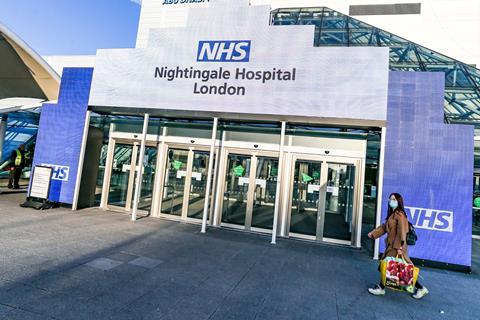Minister in charge of programme to build 40 new hospitals by 2030 says goal can only be achieved by “challenging current methods”
The government’s plan to build 40 new hospitals by 2030 will only succeed if the industry replicates the speed at which it built temporary covid-19 hospitals during the pandemic, the minister in charge of the programme has said.
Nick Markham urged the industry to adopt a “Nightingale-style” approach, referring to the collaboration between firms which saw the construction of the facilities within days during the first weeks of the pandemic in March and April 2020.
Speaking during a webinar hosted by the ∫⁄∂¥…Á«¯ Engineering Services Association (BESA) this week, Markham said supply chains needed to ‚Äúchallenge current methods‚Äù.

“These are not just buildings – they will need to be showcases for what the hospital of the future will look like,” he said.
The comments follow health secretary Steve Barclay’s announcement in parliament last month of a relaunch of the New Hospital Programme that will include five additional hospitals, although seven will no longer be completed before the original 2030 deadline.
Ministers have been criticised for the delays that have hit the programme since it was first announced by Boris Johnson in 2019. Construction work is yet to start on all but seven of the schemes, while six projects which had been given a tighter 2025 deadline have still not received planning permission or funding.
Barclay blamed the delays on two years of pandemic disruption and construction inflation caused partly by the Ukraine war.
But Markham said NHP leaders had resisted political pressure to “go go go and start building” because they wanted to take their time and get the design right first.
“This is a transformation programme, and we are determined to make it work,” said Stuart. “We need to do things differently, so please challenge us. We desperately need to get this right.”
>> Also read: What we know so far about the New Hospital Programme relaunch
He said the government had learned a lot from previous efforts to improve procurement including the £1bn prisons programme which is being built by ISG, Kier, Laing O’Rourke and Wates on an alliance contract.
But he admitted the government was “often the biggest barrier to progress” and was responsible for an “unwieldy planning process” that would need to be addressed.
“We need the industry to invest and scale up to meet this challenge,” he said. “So, we need you to have confidence in the programme.”
The main works will be procured using frameworks, likely to include the ProCure23 framework for major healthcare infrastructure construction. NHP chief programme officer Morag Stuart said the programme will also need a wider range of contractors, including new entrants to the market, to “cope with the scale of what we are doing”.
Stuart said the programme’s payment policy was not fully agreed but “the direction of travel” was not to hold retentions.
“We recognise that smaller firms have found it hard to work with government in the past so we are looking at how we can vary our routes to market…and improve engagement,” she said.
Stuart and Markham also said the NHP would take a “pragmatic” approach to achieving net zero in the NHS estate, adding that possible approaches could include making better use of innovative materials and 3D printing.


























No comments yet